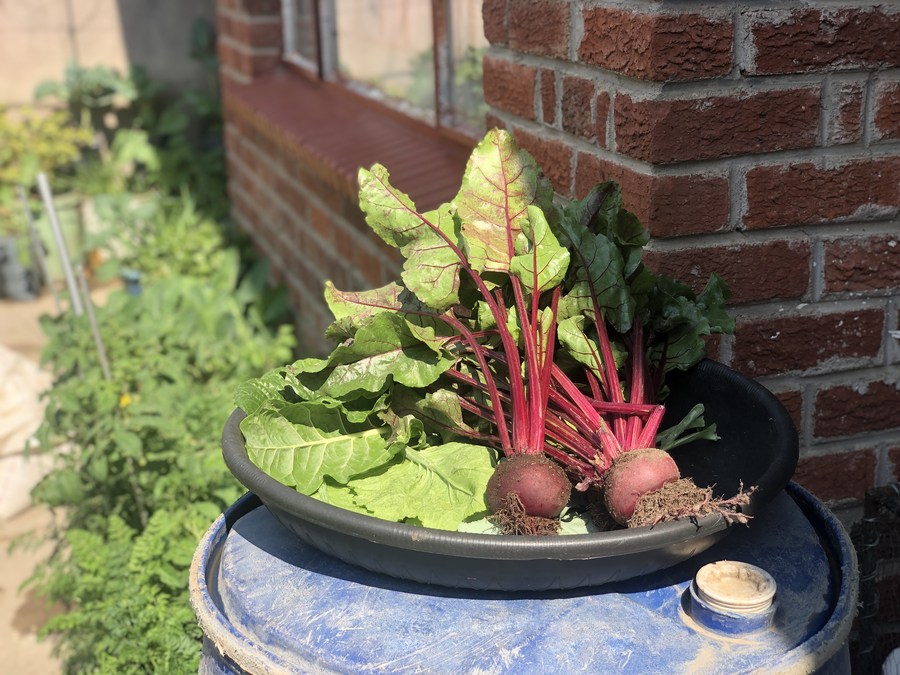As people cut back on spending and become more conscious about healthy eating during the coronavirus pandemic, backyard gardens are sprouting up in Zimbabwe's urban areas.
by Tafara Mugwara
Harare, Aug. 26 (Xinhua) -- As people cut back on spending and become more conscious about healthy eating during the coronavirus pandemic, backyard gardens are sprouting up in Zimbabwe's urban areas.
When authorities imposed a COVID-19 lockdown to curtail the spread of the virus in March, Charity Terera-Musiyiwa from Chitungwiza, a township near Harare, found herself with spare time prompting her to start gardening.

Charity Terera-Musiyiwa, a mother of three and a passionate gardener harvests beetroots from her garden in Chitungwiza, Zimbabwe, August 23, 2020. (Xinhua/Tafara Mugwara)
Her main challenge was the sheer lack of space and a shortage of water. To overcome that challenge, Musiyiwa decided to grow vegetables in polythene pots, allowing her to squeeze a sizable amount of plants on a few square meters.
Today when visitors walk from the street towards the gate that leads to Musiyiwa's home, they are welcomed by a wide variety of vegetables such as onions, lettuce, tomatoes, spinach, beetroot, carrots and cabbage.
The mother of three, who is a development worker by profession, always had a passion for gardening. Considering the many benefits of providing her own food and a desire for more self-sufficiency, she saw gardening as the way to go.
"When COVID-19 came and restrictions were imposed, I then sat down and started thinking what should I do as a woman. What should I do to help my family, I need to have fresh vegetables," she told Xinhua.
Her turn to self-provisioning was prompted in part by the high price rises of vegetables and the desire to produce her own organic food.
"The costs of purchasing vegetables from the market has gone very high so I thought if I can grow my own vegetables I can cut on the costs of purchasing vegetables," she said.
On why she decided to grow vegetables in polythene pots, she said: "I could not grow vegetables straight from the ground because I don't have land, as you can see the space is very limited here."
Musiyiwa said apart from reducing the workload, using polythene pots is an effective way of reducing the time she would otherwise spend weeding and watering the plants.
Perennial water shortages in most urban areas including Chitungwiza also means those who practice traditional gardening find it difficult to water their plants during the dry season, which runs from April to October.

Photo taken on August 23, 2020 shows freshly harvested beetroots in Chitungwiza, Zimbabwe. (Xinhua/Tafara Mugwara)
By using polythene pots she only needs 40 liters of water per week to water all her plants.
"Here in Chitungwiza we have water challenges. At times we go for two or three months without water, so if you plant them in polythene pots you use less water.
"If one plant is infected with pests or diseases I can easily destroy that plant and plant another one," she said.
Musiyiwa has since begun teaching other women in Chitungwiza to practice gardening using limited resources.
Her long term goal is to acquire land so that she can venture into commercial farming.
Musiyiwa is not the only woman who has turned to backyard gardening as a means to provide a healthy diet for her family.
The coronavirus lockdown has encouraged many urban dwellers to take up gardening as a buffer against high food prices.
Prices of basic commodities have risen drastically in Zimbabwe over the past months. Annual inflation accelerated to more than 837 percent in July, according to the Zimbabwe National Statistics Agency.
Olga Nhari, National Coordinator of Women in Agriculture Union (WAU) said since lockdown was imposed, there has been a heightened interest in vegetable growing as people seek to turn over their backyards or any available space for food production.
"The lockdown has opened many people's eyes to see the opportunities that are in agriculture," she said.
"If you look around you right now under lockdown, the most viable business is agriculture because no matter what the nation is going through people still need to eat, and they need to eat healthy as well," she said.
Nhari said many women have realized that it is economical to grow their own food. ■



